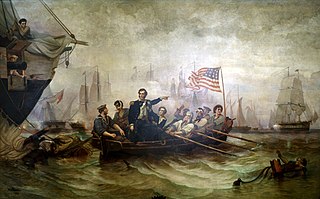conflict between the United States and the British Empire from 1812 to 1815 From Wikipedia, the free encyclopedia
The War of 1812 was fought between the British Empire and the United States from 1812 to 1815 on land in North America and at sea.[1] The British forces were helped by Canadian militia (volunteers) and Native Americans because British soldiers were busy fighting Napoleon I in Europe.


In nearly every battle, the British defeated the attacking American forces. The war increased nationalism in both Canada and the United States.
One reason given by Americans for declaring war was that the British were bothering American ships. The British claimed to be looking for British sailors who had deserted.[2] Many British sailors deserted from the miserable conditions and the harsh discipline. Originally, many of the sailors had been pressed into service.[3] It was the practice of the British to arrest any man they found on a street and to force him to serve on their ships.[3] Many British sailors who escaped signed on as crew aboard American merchant ships.[2] The British claim was somewhat true.[2]
In 1807, an American ship was boarded and then fired on, which created outrage among the American public.[2] The British were also seizing American sailors at sea and forcing them to serve in the navy.[4]
The numbers of American seamen pressed into British service is not well known and may have been greatly exaggerated.[4] The British were also sponsoring Native American territories in the Midwest to stop the United States from expanding westward.[5] That made 10,000 Native Americans fight for the British.[5]
Napoleon I started the French invasion of Russia in 1812, just as the war started in North America. The Americans thought that the British would be busy fighting the French during the Napoleonic Wars to do much in North America.
Fighting began when the United States started to attack the Canadian provinces in 1812.[1] However, the British and the Canadians successfully defended their borders. In 1813, British and American ships fought in the Battle of Lake Erie. Americans under Oliver Hazard Perry won, which gave them control of Lake Erie.[1] American forces raided and burned Toronto, which was then called York.[6]
In 1814, Napoleon I abdicated the French throne.[7] That freed up experienced British troops to be sent to North America.[7] They burned the unfinished Washington, DC, and also attacked Baltimore.[7] An American lawyer, Francis Scott Key wrote a poem about the Battle of Baltimore.[8] The poem was later used to give the words to a song that later became the US national anthem: "The Star Spangled Banner."[8] The war ended in 1815.[9] The British attacked New Orleans but were stopped by the Americans under General Andrew Jackson.[9]
Unknown by both sides, a peace treaty had already been signed.[9]
The two countries signed the Treaty of Ghent to end the war, on December 24, 1814 in Belgium. Fighting continued into January 1815 because the forces did not know about the treaty, but no great changes took place afterward. The British stopped impressing sailors because the Napoleonic Wars had been finished.
Most Americans heard of the victory in the Battle of New Orleans before they heard of the treaty. The Federalist Party, which had opposed the war, became disliked as pro-British and soon disappeared.
From the British perspective, the War of 1812 was a minor sideshow. The Americans called it their victorious "Second War for Independence".[10] The British remembered it as the Americans trying to take advantage of their being involved in a war against the French Empire and paid no attention to American grievances.[10]
In Canada, the War of 1812 was an unwanted war.[11] It concerned the distant capitals of Washington, DC, and London, not them. In Lower Canada, now Quebec, it was considered an Anglo-Saxon war.[11] In Quebec there was little love for the British, but the British had guaranteed their right to speak French.[11] Since they did not know what would happen if the Americans took over, they chose the lesser evil and supported the British.[11]
Upper Canada (later part of the Province of Ontario) had been settled by American Loyalists who fled after the Revolutionary War. They had little love of their former countrymen in the US but had become outnumbered by Americans who later came north to settle.[11] When the Americans attempted to invade Canada, the Canadian militias were eager to defend their homeland.[11]
In US history, the War of 1812 is the most obscure conflict.[12] The average American remembers very little about the war.[12] Some may remember The Star Spangled Banner, the Burning of Washington, or the Battle of New Orleans.[12] Otherwise, it is a little-understood conflict. The issues are complex. Most scholars would agree it was fought over maritime issues.[12] Since the British Navy was then the most powerful in the world, it was easier to attack the British on land by invading Canada. Former US President Thomas Jefferson predicted the "acquisition of Canada, will be a mere matter of marching."[13]
British who knew about the little war felt that they had won, no matter what Americans thought. Canadians kept their independence from the US and so felt that they had won. The Americans felt they won although they lost in Canada since they lost none of their territory, repelled the invasion of Maryland, were free to fight the Indians without British interference, and were no longer impressed on the high seas. Of all three, the British are perhaps the happiest because they have completely forgotten about the war.[14]
Seamless Wikipedia browsing. On steroids.
Every time you click a link to Wikipedia, Wiktionary or Wikiquote in your browser's search results, it will show the modern Wikiwand interface.
Wikiwand extension is a five stars, simple, with minimum permission required to keep your browsing private, safe and transparent.